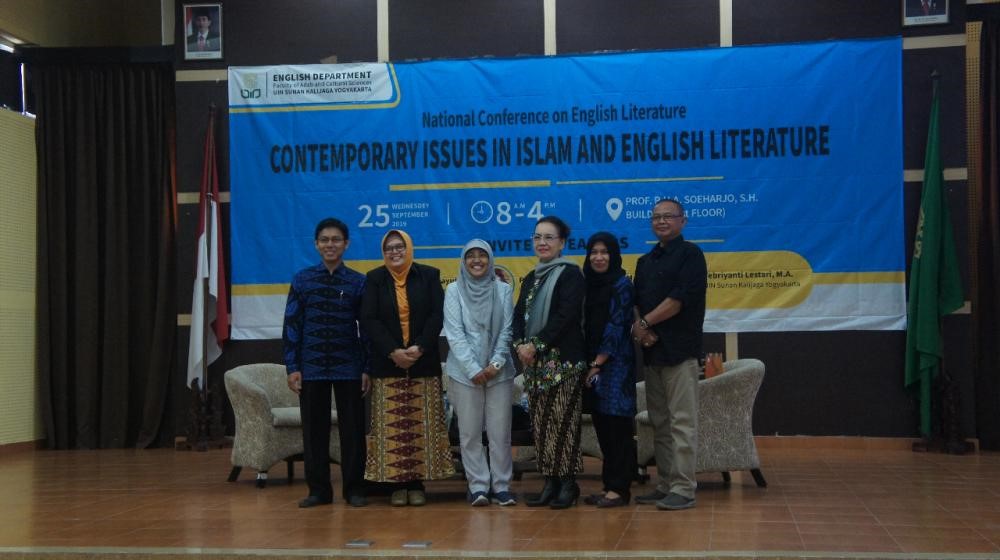English Department of UIN Sunan Kalijaga Held a National Conference on “Contemporary Issues in Islam and English Literature”

Yogyakarta (25/09/2019). In accordance with the principle of “integration-interconnection”, English Department of Sunan Kalijaga State Islamic University believes that as the time goes by and the international and intercultural barriers diminish, Islam and English literature are no longer two opposite things. Instead, they have become two things that could get along, interact, or even collaborate. To study and discuss it thoroughly, English Department of State Islamic University of Sunan Kalijaga held a national conference featuring three invited speakers, Prof. Dr. Suminto A. Sayuti from State University of Yogyakarta, Prof. Dr. Albertine Minderop, M.A. from Darma Persada University, and Febriyanti Lestari, M.A. as representative of State Islamic University of Sunan Kalijaga.
The conference started at 09.00 am with Holy Quran recitation, singing Indonesia’s national anthemIndonesia Rayaand State Islamic University of Sunan Kalijaga’s hymns, and followed by a music performance by students of English Department. Before proceeding to the main session, there were some opening speeches delivered by the head of the event committee, Harsiwi Fajarsari SS. M.A. and the Head of English Department, Ubaidillah SS. M.Hum. In his speech, he quoted a popular Arabic saying which stated that "Whoever learns the language of a people is safe from their evil". By this, he wished that the students that are learning foreign languages wouldn’t be deceived and misled by the foreign culture, instead, students should be able to learn the wisdom of foreign culture with Islamic basic principles as the filter. The last opening speech was delivered by the Dean of the Faculty of Adab and Culture Sciences. At the end of his speech, he declared that the conference was officially opened.
The first session was the presentation by the three invited speakers, with Ulyati Retno Sari, M.Hum as the moderator. Each speaker delivered his/her interesting research. All three speakers were discussing about how Islam was viewed and portrayed through the perspective of the West. The West’s view on Islam could be seen from the literary works, thus, the subjects of the researches were no other than English literature and literature in English.
This session started with Prof. Dr. Albertine as the first speaker. She presented her research on the “integration-interconnection” of Islam and Western thoughts. In her research, she found similarities in both Islam and Western thoughts, such as Emerson’s transcendentalism which corresponds to Islamic Sufism. The second speaker, Febriyanti Lestari M.A., focused on discussing the representation of Islam as seen in Western literary works. She generalized the findings into two groups: the negative representation and the neutral representation. For the negative representation, she mentioned the popular literature written by Dante as an example,Inferno. As for the neutral representation, she mentioned examples such asAlmynaandMan of Law. In her opinion, this happened due to the lack of sources of information about Islam in Western nations and religious politicization based on history. The third and last invited speaker, Prof. Dr. Suminto A. Sayuti from State University of Yogyakarta, delivered his thought about the essence ofIslam in English Literatureitself. He critically questioned the roleIslamheld within the term ofIslam in English Literature. He implied that in certain contexts, Islam could act as a culture, and in other contexts, it could pose purely as religion. He asserted the importance of clear qualifications or standards and critical thinking in classifying theIslamicliterature andIslamliterature. This is because although those two may seem alike, they are actually two different things with difference essence. Due to this difference, we surely need to use different perspectives and methods to study each of them.
After the end of the first session, all panelists were accompanied to participate in the panel discussion in the designated places. This panel discussion then was held in different places to make the discussion more effective and efficient considering the large number of participants. These divisions were made based on the interest and the focus of their research. The first group which was presenting the applied linguistics researches was led to the Dean meeting room of Faculty of Adab and Cultural Sciences, while the other panel discussion which was presenting the Contemporary Literature researches took place in the assembly room of Faculty of Adab and Cultural Sciences. The panelists came from various backgrounds such as college students, lecturers, and even teachers. Not only that, there were also panelists from outside the Yogyakarta City, such as Bandung, Semarang, and so on.
Though the event was divided into two subgroups, all panelists were so excited to participate in the panel discussion. The panelists presented their research with so much enthusiasm and the audiences responded to their presentation by asking questions and giving suggestions.
